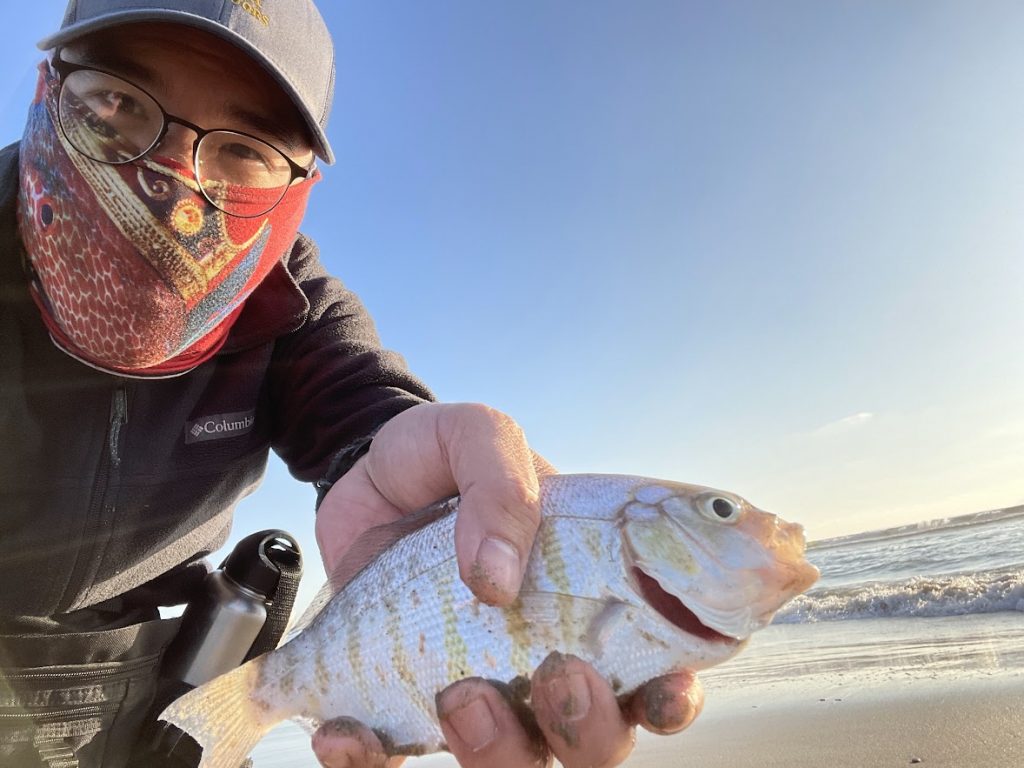Fishing on the beach can be a relaxing and enjoyable activity for people of all ages. Whether you’re a seasoned angler or a beginner, there are a few key things you should know to make your beach fishing experience as successful as possible. Here’s how to fish on the beach:

Choose the right equipment
When it comes to beach fishing, it’s important to use the right equipment for the job. A medium- to heavy-duty rod with a fast action and a good quality reel is a good choice. You’ll also need a selection of hooks, weights, and sinkers to help you cast your line further out into the water.
Personally, the two main rods I use for fishing on the beach are an 8-6 Okuma steelhead rod for jigging, and an 11-foot medium-heavy casting rod to soak bait. These days, I’ve been using the 11-foot rod much more often when surf fishing.
Get your fishing license
Before fishing on the beach, know your local regulations. Here in California, anglers over 16-years of age are required to have a state fishing license that can be purchased through the Department of Fish and Wildlife website. If you decide that you’re not ready to purchase a fishing license, we have a few days a year that are free fishing days — days when you don’t need a license. Otherwise, you are able to fish from piers without a license.
Know the tides
The tides play a major role in beach fishing success. Fish tend to feed more actively during incoming tides, when baitfish are pushed towards the shore. Additionally, here in the west, the incoming tide also stirs up the sandbars, loosening up sand crabs. Pay attention to the tides and plan your fishing trips around the incoming tide for the best results.
Use the right bait
Different types of fish prefer different types of bait, so it’s important to choose the right bait for the species you’re targeting. Live bait, such as worms or sand crabs, can be effective. If you don’t have live bait on hand, dehydrated squid baits and salted mussels baits are a convenient alternative to catching a variety of fish. Lastly, artificial lures, such as jigs or soft plastics, can also be successful using lighter tackle.
Experiment with different baits to see what works best for the type of fish you’re after.
Find the right spot
Not all beaches are created equal when it comes to fishing. Look for spots with drop-offs, ledges, or other structures that can attract fish. Areas with breakers or surf can also be good places to fish, as they often contain baitfish that larger predatory fish feed on.
Cast your line properly
Proper casting technique is key to successful beach fishing. Hold the rod with both hands, using your dominant hand to control the reel and your other hand to support the rod. Stand with your feet shoulder-width apart and point the rod towards your target. To cast, smoothly extend your arm and flick the rod tip upwards to release the line. Practice your casting technique to increase the distance you can cast your line.
A rod holder that you can stake in the sand is primo when fishing on the beach with bait.
Pay attention to the weather
The weather can have a big impact on beach fishing success. Overcast days can be good for fishing, as the clouds provide cover for fish and make them more likely to feed. Windy conditions can also be good for fishing, as they can create waves and currents that attract baitfish. On the other hand, very hot or sunny days can be less productive, as the bright light can make it difficult for fish to see your bait.
Be patient when learning how to fish on the beach
Fishing from the beach requires patience. It may take a while to get a bite, and even longer to land a fish. Don’t get discouraged if you don’t catch anything right away – keep trying and you’ll eventually have success.
Practice catch and release
Once you’ve learn how to fish on the beach and start catching, consider practicing catch and release to help preserve the local fish population. Carefully remove the hook and gently release the fish back into the water.
By following these tips, you’ll be well on your way to a successful beach fishing trip. With the right equipment, knowledge of the tides and weather, and a bit of patience, you’ll be able to enjoy the peaceful and rewarding experience of fishing from the beach.